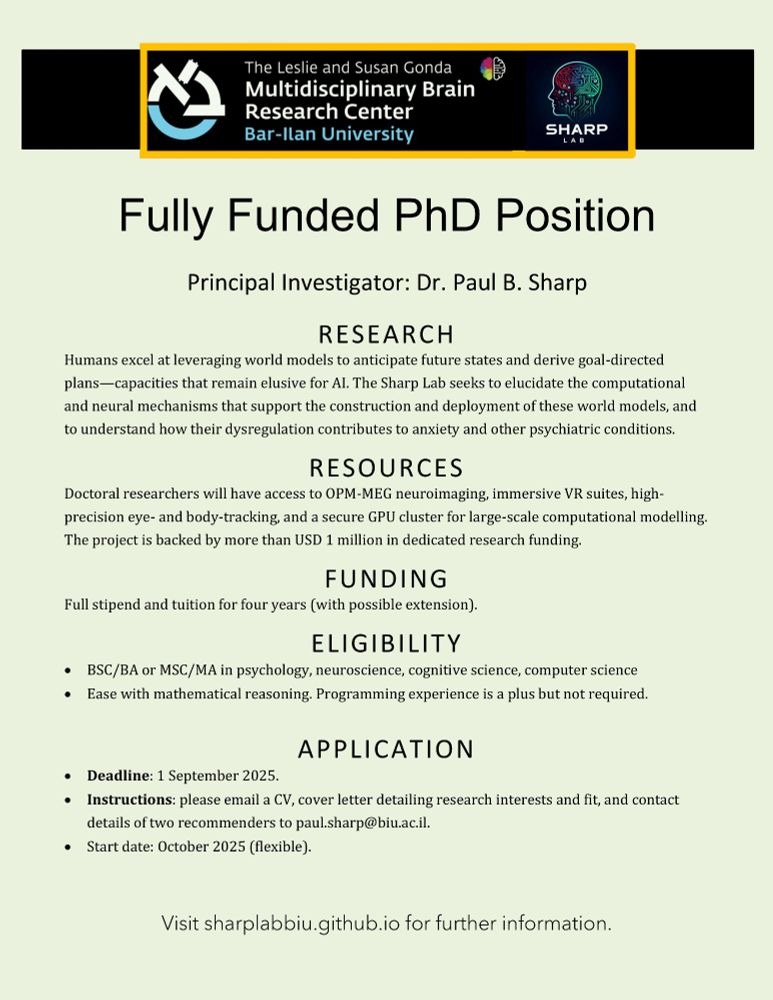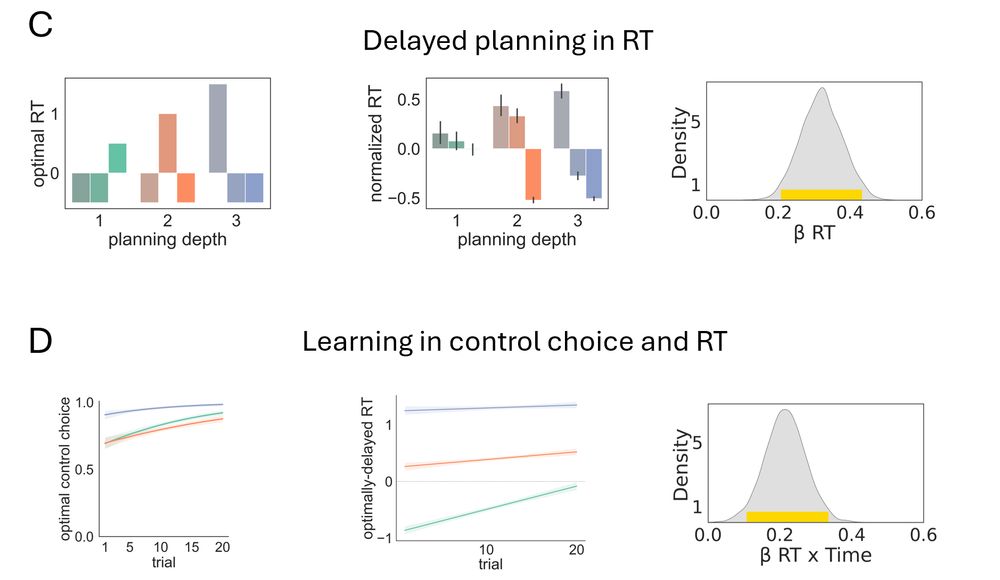
Paul Sharp
@paulbsharp.bsky.social
Assistant professor of psychology, Bar-Ilan University | computational cognitive science & psychiatry
"Discovery happens less when you're trying to be the expert and more when you're trying to be the learner." - Itai Yanai
Website: sharplabbiu.github.io
"Discovery happens less when you're trying to be the expert and more when you're trying to be the learner." - Itai Yanai
Website: sharplabbiu.github.io
Thanks Toby - looks like it needs to be approved first, must be a new thing from my recollection I thought it went live immediately...

October 13, 2025 at 9:10 AM
Thanks Toby - looks like it needs to be approved first, must be a new thing from my recollection I thought it went live immediately...
Why does this matter? The bias was differential: Under-generalization hurt performance when facing new instances of threat-related tasks (where that knowledge would be useful) but helped slightly with safe tasks.
Worry predicted worse generalization for threat vs. safe contexts (see Figure 4).
7/12
Worry predicted worse generalization for threat vs. safe contexts (see Figure 4).
7/12

October 13, 2025 at 6:30 AM
Why does this matter? The bias was differential: Under-generalization hurt performance when facing new instances of threat-related tasks (where that knowledge would be useful) but helped slightly with safe tasks.
Worry predicted worse generalization for threat vs. safe contexts (see Figure 4).
7/12
Worry predicted worse generalization for threat vs. safe contexts (see Figure 4).
7/12
This is under-generalization, not over-generalization—the opposite of what we see in perceptual fear conditioning!
When making planning errors, high-worry individuals were LESS likely to reuse actions associated with threat contexts, excluding behavioral repertoires from their task models.
6/12
When making planning errors, high-worry individuals were LESS likely to reuse actions associated with threat contexts, excluding behavioral repertoires from their task models.
6/12

October 13, 2025 at 6:30 AM
This is under-generalization, not over-generalization—the opposite of what we see in perceptual fear conditioning!
When making planning errors, high-worry individuals were LESS likely to reuse actions associated with threat contexts, excluding behavioral repertoires from their task models.
6/12
When making planning errors, high-worry individuals were LESS likely to reuse actions associated with threat contexts, excluding behavioral repertoires from their task models.
6/12
In a planning phase, participants saw NEW vehicles and had to plan 4-step sequences without feedback. Success required correctly inferring the task category of the vehicle.
We tested higher-order generalization ( a car or truck?) and lower-order generalization (which specific car?).
4/12
We tested higher-order generalization ( a car or truck?) and lower-order generalization (which specific car?).
4/12

October 13, 2025 at 6:30 AM
In a planning phase, participants saw NEW vehicles and had to plan 4-step sequences without feedback. Success required correctly inferring the task category of the vehicle.
We tested higher-order generalization ( a car or truck?) and lower-order generalization (which specific car?).
4/12
We tested higher-order generalization ( a car or truck?) and lower-order generalization (which specific car?).
4/12
1st Sharp Lab preprint! 🚨 We tested how anxiety affects task generalization—not how people generalize threat stimuli, but how they reuse action-outcome structures when planning in new contexts.
Worry makes people avoid reusing actions that co-occurred w/ threat!
📄: osf.io/preprints/ps...
🧵 1/12
Worry makes people avoid reusing actions that co-occurred w/ threat!
📄: osf.io/preprints/ps...
🧵 1/12

October 13, 2025 at 6:30 AM
1st Sharp Lab preprint! 🚨 We tested how anxiety affects task generalization—not how people generalize threat stimuli, but how they reuse action-outcome structures when planning in new contexts.
Worry makes people avoid reusing actions that co-occurred w/ threat!
📄: osf.io/preprints/ps...
🧵 1/12
Worry makes people avoid reusing actions that co-occurred w/ threat!
📄: osf.io/preprints/ps...
🧵 1/12
🚨 Fully Funded PhD positions
Gonda Brain Institute, Sharp Lab
We will explore how people build and deploy world models efficiently for planning and decision making. We will also seek to characterize how world models construal and use is biased in anxiety.
Deadline: 1 Sept 2025. Please share!
Gonda Brain Institute, Sharp Lab
We will explore how people build and deploy world models efficiently for planning and decision making. We will also seek to characterize how world models construal and use is biased in anxiety.
Deadline: 1 Sept 2025. Please share!

July 22, 2025 at 8:48 AM
🚨 Fully Funded PhD positions
Gonda Brain Institute, Sharp Lab
We will explore how people build and deploy world models efficiently for planning and decision making. We will also seek to characterize how world models construal and use is biased in anxiety.
Deadline: 1 Sept 2025. Please share!
Gonda Brain Institute, Sharp Lab
We will explore how people build and deploy world models efficiently for planning and decision making. We will also seek to characterize how world models construal and use is biased in anxiety.
Deadline: 1 Sept 2025. Please share!
What an awesome #CPConf2025! If you're interested in funded PhD or PostDoc opportunities (remote possible) do reach out (Paul.sharp@biu.ac.il).
we have exciting new paradigms modelling planning, meta- control, offline learning, and their relation to psychopathology.
See: Sharplabbiu.github.io
we have exciting new paradigms modelling planning, meta- control, offline learning, and their relation to psychopathology.
See: Sharplabbiu.github.io

July 17, 2025 at 6:28 AM
What an awesome #CPConf2025! If you're interested in funded PhD or PostDoc opportunities (remote possible) do reach out (Paul.sharp@biu.ac.il).
we have exciting new paradigms modelling planning, meta- control, offline learning, and their relation to psychopathology.
See: Sharplabbiu.github.io
we have exciting new paradigms modelling planning, meta- control, offline learning, and their relation to psychopathology.
See: Sharplabbiu.github.io
#CPConf2025 looking forward to seeing you at our symposium tomorrow on cognitive map biases across psychopathology.
The design choice is a combination of first-year PI + addressing post-lunch fatigue. Here you go...!
with the inimitable @mgarvert.bsky.social, @carocharp.bsky.social & Matt Nour.
The design choice is a combination of first-year PI + addressing post-lunch fatigue. Here you go...!
with the inimitable @mgarvert.bsky.social, @carocharp.bsky.social & Matt Nour.

July 14, 2025 at 10:52 AM
#CPConf2025 looking forward to seeing you at our symposium tomorrow on cognitive map biases across psychopathology.
The design choice is a combination of first-year PI + addressing post-lunch fatigue. Here you go...!
with the inimitable @mgarvert.bsky.social, @carocharp.bsky.social & Matt Nour.
The design choice is a combination of first-year PI + addressing post-lunch fatigue. Here you go...!
with the inimitable @mgarvert.bsky.social, @carocharp.bsky.social & Matt Nour.
What were the key parameters contributing to optimally delayed planning? The amount of second action roll-outs (second action breadth). Additionally, the tendency to use model-based meta-control values, and the bias to explore the benefits of relinquishing control. (10/15)

July 5, 2025 at 7:19 AM
What were the key parameters contributing to optimally delayed planning? The amount of second action roll-outs (second action breadth). Additionally, the tendency to use model-based meta-control values, and the bias to explore the benefits of relinquishing control. (10/15)
The model could capture the data well. Simulating the model allowed us to generate the main behavioral trends in the empirical data: optimally delayed control, learning to delay control over time, and sensitivity of meta-control choice to prior reward. (8/15)

July 5, 2025 at 7:19 AM
The model could capture the data well. Simulating the model allowed us to generate the main behavioral trends in the empirical data: optimally delayed control, learning to delay control over time, and sensitivity of meta-control choice to prior reward. (8/15)
🧠 Computational modelling revealed the mechanism: People used a mix of strategies, including using a cognitive map to search for first- and second-action routes toward a goal, reward-sensitive caching, control choice bias, and within-episode perseveration. Overall we tested 14 models (7/15)

July 5, 2025 at 7:19 AM
🧠 Computational modelling revealed the mechanism: People used a mix of strategies, including using a cognitive map to search for first- and second-action routes toward a goal, reward-sensitive caching, control choice bias, and within-episode perseveration. Overall we tested 14 models (7/15)
Control choice trends alone leave open the possibility people pre-planned. To precisely measure delayed planning, we looked to RT. People increased RT at decision points where planning should begin, and lowered RT before planning, and after planning initiation (i.e., planning execution). (6/15)

July 5, 2025 at 7:19 AM
Control choice trends alone leave open the possibility people pre-planned. To precisely measure delayed planning, we looked to RT. People increased RT at decision points where planning should begin, and lowered RT before planning, and after planning initiation (i.e., planning execution). (6/15)
📊 Results across 2 studies (n=93, n=163):
Participants performed well, and improved over time. Thus, participants were, well above chance, able to learn when to relinquish control at decisions steps where planning was unnecessary, across 3 different goals with varying planning depths. (5/15)
Participants performed well, and improved over time. Thus, participants were, well above chance, able to learn when to relinquish control at decisions steps where planning was unnecessary, across 3 different goals with varying planning depths. (5/15)

July 5, 2025 at 7:19 AM
📊 Results across 2 studies (n=93, n=163):
Participants performed well, and improved over time. Thus, participants were, well above chance, able to learn when to relinquish control at decisions steps where planning was unnecessary, across 3 different goals with varying planning depths. (5/15)
Participants performed well, and improved over time. Thus, participants were, well above chance, able to learn when to relinquish control at decisions steps where planning was unnecessary, across 3 different goals with varying planning depths. (5/15)
💡 The clever manipulation: At certain decision points, BOTH actions equally lead to the goal → planning is unnecessary! We let participants "relinquish control" to the computer (with a small reward; computer chose randomly) when planning wasn't needed. (4/15)

July 5, 2025 at 7:19 AM
💡 The clever manipulation: At certain decision points, BOTH actions equally lead to the goal → planning is unnecessary! We let participants "relinquish control" to the computer (with a small reward; computer chose randomly) when planning wasn't needed. (4/15)
🎯 We developed a novel 3-step decision tree task where participants navigate toward goals with different "planning depths" - the number of steps before the goal where planning must begin to succeed. Key insight: sometimes it's optimal to delay planning! (3/15)

July 5, 2025 at 7:19 AM
🎯 We developed a novel 3-step decision tree task where participants navigate toward goals with different "planning depths" - the number of steps before the goal where planning must begin to succeed. Key insight: sometimes it's optimal to delay planning! (3/15)
🤔 Consider this: You're stressed about a presentation months away & start planning at midnight in bed. This premature planning ignores the benefits of delaying (consulting colleagues) & underestimates costs (mental effort, sleep disruption). So how do we study this in the lab? (2/15)

July 5, 2025 at 7:19 AM
🤔 Consider this: You're stressed about a presentation months away & start planning at midnight in bed. This premature planning ignores the benefits of delaying (consulting colleagues) & underestimates costs (mental effort, sleep disruption). So how do we study this in the lab? (2/15)
🚨New preprint! WHEN should we plan toward a goal? Most research focuses on how and where to plan, but the timing of planning initiation has been overlooked. We show humans leverage a cognitive map - called model-based meta-control - to learn when to deploy a plan.
🧵(1/15)
osf.io/preprints/ps...
🧵(1/15)
osf.io/preprints/ps...

July 5, 2025 at 7:19 AM
🚨New preprint! WHEN should we plan toward a goal? Most research focuses on how and where to plan, but the timing of planning initiation has been overlooked. We show humans leverage a cognitive map - called model-based meta-control - to learn when to deploy a plan.
🧵(1/15)
osf.io/preprints/ps...
🧵(1/15)
osf.io/preprints/ps...
All should agree about innocent Israelis & Iranians caught in this insanity. Implying destroying imminent Iran nukes is wrong is wrong too. I've lived through ballistic missiles targeting Tel Aviv civilians (image of today's TLV hit). Now imagine that with a nuke. It's different living through it.

June 22, 2025 at 8:43 AM
All should agree about innocent Israelis & Iranians caught in this insanity. Implying destroying imminent Iran nukes is wrong is wrong too. I've lived through ballistic missiles targeting Tel Aviv civilians (image of today's TLV hit). Now imagine that with a nuke. It's different living through it.
Zurich has good cortados. Passed the test.



May 16, 2025 at 12:46 PM
Zurich has good cortados. Passed the test.
Come join the lab for a fully-funded PhD! Ground-breaking computational psychiatry work using OPM-MEG, VR + massive online testing. 𝙍𝙚𝙢𝙤𝙩𝙚 𝙥𝙤𝙨𝙞𝙩𝙞𝙤𝙣𝙨 𝙢𝙖𝙮 𝙗𝙚 𝙥𝙤𝙨𝙨𝙞𝙗𝙡𝙚 𝙛𝙤𝙧 𝙩𝙝𝙤𝙨𝙚 𝙤𝙪𝙩𝙨𝙞𝙙𝙚 𝙄𝙇. Reach out + please share widely!
Lab: sharplabbiu.github.io
#compneuro
#computationalpsychiatry
Lab: sharplabbiu.github.io
#compneuro
#computationalpsychiatry

January 30, 2025 at 9:21 AM
Come join the lab for a fully-funded PhD! Ground-breaking computational psychiatry work using OPM-MEG, VR + massive online testing. 𝙍𝙚𝙢𝙤𝙩𝙚 𝙥𝙤𝙨𝙞𝙩𝙞𝙤𝙣𝙨 𝙢𝙖𝙮 𝙗𝙚 𝙥𝙤𝙨𝙨𝙞𝙗𝙡𝙚 𝙛𝙤𝙧 𝙩𝙝𝙤𝙨𝙚 𝙤𝙪𝙩𝙨𝙞𝙙𝙚 𝙄𝙇. Reach out + please share widely!
Lab: sharplabbiu.github.io
#compneuro
#computationalpsychiatry
Lab: sharplabbiu.github.io
#compneuro
#computationalpsychiatry
Loving the ultrawide monitor experience. New office is coming together 🍾

January 2, 2025 at 12:42 PM
Loving the ultrawide monitor experience. New office is coming together 🍾
To celebrate the new year on 🦋, reposting our paper on why we plan forward or backward in time @naturehumbehav.bsky.social . We develop a computational theory for why we use predecessor / successor reps as a function of task structure.
read: rdcu.be/dNWDV
🧠📈 🧪
#compneuro
#computationalpsychiatry
read: rdcu.be/dNWDV
🧠📈 🧪
#compneuro
#computationalpsychiatry

December 31, 2024 at 7:33 AM
To celebrate the new year on 🦋, reposting our paper on why we plan forward or backward in time @naturehumbehav.bsky.social . We develop a computational theory for why we use predecessor / successor reps as a function of task structure.
read: rdcu.be/dNWDV
🧠📈 🧪
#compneuro
#computationalpsychiatry
read: rdcu.be/dNWDV
🧠📈 🧪
#compneuro
#computationalpsychiatry
Come be my colleague! We're opening a tenure-track AP in Psychology (due Jan 22nd). The dept is great - supportive colleagues, highly interdisciplinary, with access to resources like OPM-MEG, VR. Feel free to reach out with any questions + please share

December 22, 2024 at 2:02 PM
Come be my colleague! We're opening a tenure-track AP in Psychology (due Jan 22nd). The dept is great - supportive colleagues, highly interdisciplinary, with access to resources like OPM-MEG, VR. Feel free to reach out with any questions + please share
If one recruits knowledge that makes the planning problem harder to solve (like needing to simulate many expressions of confidence to get hired from a non-self-confident task model), it can create cycles of negative repetitive planning episodes (ie worry).

November 27, 2024 at 2:27 PM
If one recruits knowledge that makes the planning problem harder to solve (like needing to simulate many expressions of confidence to get hired from a non-self-confident task model), it can create cycles of negative repetitive planning episodes (ie worry).
🚨 Clinicians have noted for decades how planning & anxiety are linked. Yet, computational psychiatry thus far failed to show how. Here, I explain that we need to broaden how we model planning to reveal its *biases* in chronic anxiety. A 🧵 on the framework 1/n
authors.elsevier.com/a/1kAJC4sIRv...
authors.elsevier.com/a/1kAJC4sIRv...

November 27, 2024 at 2:27 PM
🚨 Clinicians have noted for decades how planning & anxiety are linked. Yet, computational psychiatry thus far failed to show how. Here, I explain that we need to broaden how we model planning to reveal its *biases* in chronic anxiety. A 🧵 on the framework 1/n
authors.elsevier.com/a/1kAJC4sIRv...
authors.elsevier.com/a/1kAJC4sIRv...

